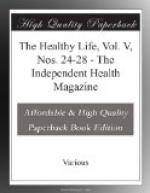it is the thought of being thought afraid
that is a very real and present fear.)
But, if this standpoint is right, is not fear at least a vestigial organ, a survival of a mental activity which served its purpose in times gone by? Is it not even truer to go further still and say, as each particular fear serves its purpose it may safely be discarded, but that, as far as our present knowledge goes, other grades of sensitiveness, finer shades of imagination of the type we have called fear, must take its place, to be discarded in their turn for yet other apprehensions?
For if we lost the kind of perception that we associate with fear, if our imagination closed itself automatically to the suggestion of all sorts of ugly possibilities, should we not find ourselves soon in the midst of difficulties akin to those of the hero of the German tale of the man who felt no pain? We accept the evidence of pain as a guide to action; when we have decided on action we proceed to get rid of the pain as expeditiously, safely and permanently as we can.
The same thing seems true of fear. Over and over again we laugh at ourselves for fearing something that either never happened at all or happened in such a way as to be softened out of all likeness to the monstrous terror we had created. On the other hand, when misfortune falls heavily because of our lack of imagination in not foreseeing possible consequences of particular actions or events, we lament and complain: “If I could only have guessed! If I had only known!”
Fear pure and simple—the imagination of possible trouble—is a stage we can hardly yet afford to do without. But when it has roused our attention to a danger, its work is done. Let us practise turning it into action; taking due precautions against accident, guarding against hurting a neighbour’s feelings, watching some possibility of evil tendency in ourselves. Then, and not till then, may we let it drop. It may pass; it has done its work. It is no longer our responsibility to foresee, it is our privilege to lay down the fear and live happily and at peace.
Even the dread perceptions of eternal laws come
under the same method.
“The fear of the Lord is the beginning
of wisdom,” the beginning:
the end is faith and love.
E.M. COBHAM.
+------------------------------------------------------
--------+ | | | #To Our Readers.# | | | | Readers who appreciate the independence and all-round nature | | of The Healthy Life can materially assist the extension of | | its circulation by tactfully urging their local newsagent to | | have the magazine regularly displayed for sale. An | | attractive monthly poster can always be had free from the | | Publishers, 3 Tudor Street, London, E.C. | | | +--------------------------------------------------------------+
HOW MUCH SHOULD WE EAT?




